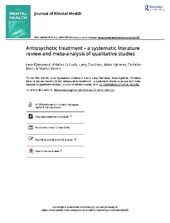| dc.contributor.author | Bjørnestad, Jone Ravndal | |
| dc.contributor.author | Lavik, Kristina O. | |
| dc.contributor.author | Davidson, Larry | |
| dc.contributor.author | Hjeltnes, Aslak | |
| dc.contributor.author | Moltu, Christian | |
| dc.contributor.author | Veseth, Marius | |
| dc.date.accessioned | 2020-06-26T11:58:15Z | |
| dc.date.available | 2020-06-26T11:58:15Z | |
| dc.date.issued | 2019 | |
| dc.Published | Bjørnestad JR, Lavik KOL, Davidson L, Hjeltnes A, Moltu C, Veseth M. Antipsychotic treatment – a systematic literature review and meta-analysis of qualitative studies. Journal of Mental Health. 2019 | eng |
| dc.identifier.issn | 1360-0567 | |
| dc.identifier.issn | 0963-8237 | |
| dc.identifier.uri | https://hdl.handle.net/1956/23049 | |
| dc.description.abstract | Background: The literature on antipsychotic medication in psychosis lack systematization of the empirical knowledge base on patients’ subjective experiences of using antipsychotic drugs. Such investigations are pivotal to inform large-scale trials with clinically relevant hypotheses and to illuminate clinical implications for different sub-groups of individuals. Aims: To re-analyze and summarize existing qualitative research literature on patient perspectives of using antipsychotic medication. Method: A systematic literature search was performed in September 2018 (Protocol registration no. CRD42017074394). Using an existing framework of meta-analyzing qualitative research, full text evaluation was conducted for 41 articles. Thirty-two articles were included for the final synthesis. Results: Four meta-themes were identified: (1) short-term benefits; (2) adverse effects and coping processes; (3) surrender and autonomy; (4) long-term compromise of functional recovery. Conclusions: While largely positive about acute and short-term use, patients are more skeptical about using antipsychotic drugs in the longer term. The latter specifically relates to processes of functional and social recovery. The clinical conversations about antipsychotic medication need to include evaluations of contexts of patient experience level, patient autonomy processes, patient values and risk preferences, and patient knowledge and knowledge needs in addition to assessing the severity of symptoms of psychosis. | en_US |
| dc.language.iso | eng | eng |
| dc.publisher | Taylor & Francis | eng |
| dc.rights | Attribution-NonCommercial-NoDerivs CC BY-NC-ND | eng |
| dc.rights.uri | http://creativecommons.org/licenses/by-nc-nd/4.0/ | eng |
| dc.title | Antipsychotic treatment – a systematic literature review and meta-analysis of qualitative studies | eng |
| dc.type | Peer reviewed | |
| dc.type | Journal article | |
| dc.date.updated | 2019-11-20T08:31:48Z | |
| dc.description.version | publishedVersion | |
| dc.rights.holder | Copyright 2019 Informa UK Limited, trading as Taylor & Francis Group | eng |
| dc.identifier.doi | https://doi.org/10.1080/09638237.2019.1581352 | |
| dc.identifier.cristin | 1692329 | |
| dc.source.journal | Journal of Mental Health | |

